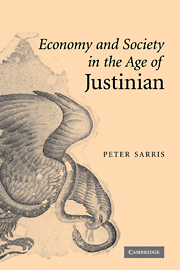Book contents
- Frontmatter
- Contents
- List of figures
- Preface
- Introduction
- 1 Egypt and the political economy of empire
- 2 The Apion archive: economic structure and estate accounts
- 3 Labour and administration: the evidence of the contractual papyri
- 4 Letters and petitions: social relations in the sixth-century Oxyrhynchite
- 5 The Apiones and their analogues
- 6 On the margins of magnate power: Dioscorus and Aphrodito
- 7 Landscapes of power: the great estate beyond Egypt
- 8 The historiography of the great estate
- 9 The great estate and the imperial authorities
- 10 The rise of the great estate
- 11 Economy and society in the age of Justinian
- Conclusion
- Bibliography
- Index
8 - The historiography of the great estate
Published online by Cambridge University Press: 24 July 2009
- Frontmatter
- Contents
- List of figures
- Preface
- Introduction
- 1 Egypt and the political economy of empire
- 2 The Apion archive: economic structure and estate accounts
- 3 Labour and administration: the evidence of the contractual papyri
- 4 Letters and petitions: social relations in the sixth-century Oxyrhynchite
- 5 The Apiones and their analogues
- 6 On the margins of magnate power: Dioscorus and Aphrodito
- 7 Landscapes of power: the great estate beyond Egypt
- 8 The historiography of the great estate
- 9 The great estate and the imperial authorities
- 10 The rise of the great estate
- 11 Economy and society in the age of Justinian
- Conclusion
- Bibliography
- Index
Summary
INTRODUCTION
As seen in the previous chapter, the laws concerning coloni adscripticii record the widespread existence by the early sixth century of great estates throughout the Eastern Empire, many of which were apparently bipartite in character. But the law-codes reveal more than the mere existence of these estates. Rather, the legal sources, especially the constitutions contained in the Codex Theodosianus and the Codex Iustinianus, attest a process of estate emergence and expansion over the course of the fourth, fifth, and sixth centuries. This phenomenon is at its most evident in those constitutions which detail the illicit patronage or patrocinium engaged in by landowners and their managers. Much of this legislation is primarily concerned with tax evasion, and the related issue of estate autopragia or ‘self-collection’ of taxes, but amongst the other issues touched upon are the maintenance of private estate prisons, and the illegal deployment of private armed retainers or buccellarii.
This legislation, and what it tells us of early Byzantine social conditions, will be the main focus of the two chapters that follow. But it is worth pausing at this point to consider how this legislation has been interpreted, and how the great estates have come to be understood, by recent generations of historians. For the question of how we situate the great estates socially and juridically has been hotly, at times fiercely, contested since the 1940s, and any clarification of the issues concerned necessarily requires something by way of historiographical analysis.
- Type
- Chapter
- Information
- Economy and Society in the Age of Justinian , pp. 131 - 148Publisher: Cambridge University PressPrint publication year: 2006



